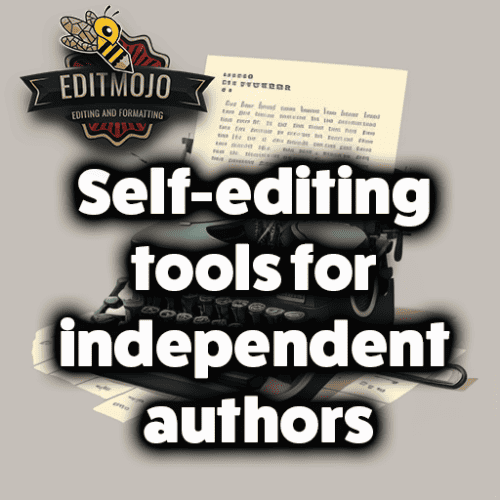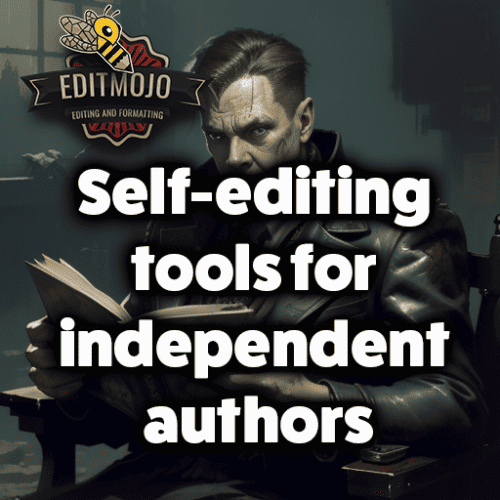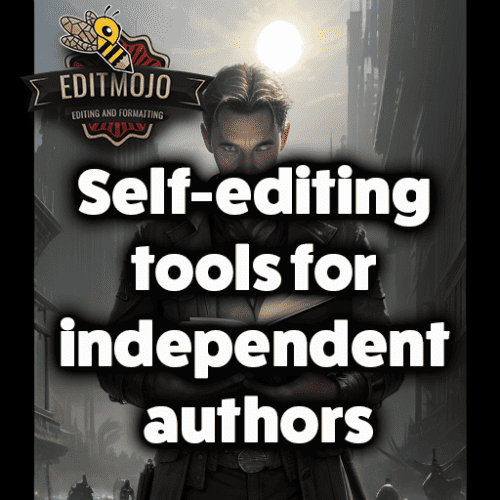Self-editing tools for independent authors
Self-editing tools for independent authors. In the pulsating rhythm of the digital age, the publishing landscape has metamorphosed dramatically. The corridors of traditional publishing that once seemed impenetrable are giving way to the exciting and democratic world of independent publishing. More and more writers are embracing the role of independent authors, turning the spotlight on the dire need for proficient self-editing.
As an independent author, you are the writer, editor, and publisher, all rolled into one. You may not have access to professional editing services, making self-editing a crucial step in your journey. But fear not! There’s an array of self-editing tools available online to help you out, like the innovative platform, EditMojo.com.
Key Takeaways
| Key Points | Details |
|---|---|
| The Importance of Self-Editing | Independent authors must rely on self-editing to ensure their work is polished and professional. |
| Self-Editing Challenges | Authors may overlook errors in their work due to proximity and familiarity, impacting the quality of the manuscript. |
| Role of Self-Editing Tools | Tools like EditMojo.com provide comprehensive features including grammar checking, style editing, and readability scoring to aid authors in refining their manuscripts. |
| Effective Use of Self-Editing Tools | Use these tools in stages during your writing process for maximum efficiency. |
| Self-Editing Tools vs. Professional Editing Services | While self-editing tools provide substantial preliminary editing help, they can’t fully replace professional editing services for nuanced literary elements. |
| Future of Self-Editing Tools | The future holds promise for more advanced self-editing tools driven by AI and machine learning. |
The Self-Editing Challenge for Independent Authors
Editing is like refining raw gold – it transforms a good manuscript into a masterpiece. As independent authors, the task of editing can feel monumental. The intricacies of grammar, punctuation, and style are complex, and overlooking an error can disrupt the reader’s immersion. The proverb “you can’t see the forest for the trees” holds true; you may miss glaring issues in your own work, simply because you’re too close to it.
Additionally, in today’s hyper-competitive literary market, poorly edited works can be a death knell for reader engagement and book sales. As Mark Twain wisely opined, “The difference between the almost right word and the right word is really a large matter – it’s the difference between the lightning bug and the lightning.”

Understanding Self-Editing Tools
This is where self-editing tools come into the picture, rising like a phoenix to aid independent authors. They’re like your virtual, tireless, and detail-oriented editing assistants that scrutinize your work for common writing mistakes.
Self-editing tools provide a wide range of benefits. They offer instant feedback, enabling you to rectify errors as you write. Moreover, they can improve your writing skills by providing insights into your recurrent mistakes and stylistic weaknesses.
There are three main types of self-editing tools:
- Grammar checkers that highlight grammar and punctuation errors.
- Style editors that help enhance your sentence structure and writing style.
- Readability scorers that measure the readability of your text and suggest improvements.
EditMojo.com: A Revolutionary Self-Editing Tool
Emerging as a game-changer in the arena of self-editing tools is EditMojo.com. With a dynamic suite of features designed to enhance and streamline the editing process, EditMojo stands apart from the crowd.
What makes EditMojo unique? It’s not just an advanced grammar and spell checker, but it also provides a contextual thesaurus and word choice assistance. This feature can transform your work from a plain text into a rich tapestry of nuanced language.
Next, its in-depth style and sentence structure analysis digs deeper, enhancing the flow and readability of your manuscript. And finally, the readability scoring feature helps ensure that your work is accessible to your intended audience.
Many independent authors who’ve used EditMojo.com praise it for its comprehensive features and user-friendly interface. Author Jane Doe, known for her bestselling mystery novels, gushes, “EditMojo has completely transformed my writing process! It’s like having a personal editor on call 24/7.”
How to Effectively Use Self-Editing Tools
Integrating self-editing tools into your writing process doesn’t have to be overwhelming. Here’s a simple guide to get started:
- Write your draft: Don’t worry about perfection in the first go.
- Run your draft through a grammar checker, like EditMojo’s advanced grammar and spell checker.
- Refine your sentence structure and style using a style editor.
- Use a readability scorer to ensure your work is easy to understand for your target audience.
- Revise and proofread your manuscript based on the feedback from these tools.
Self-Editing Tools vs. Professional Editing Services
Despite the many benefits of self-editing tools, it’s important to remember that they are not a complete replacement for professional editing services. These tools are excellent for catching basic errors and enhancing your writing style. However, they may not be as effective in detecting nuanced issues like plot inconsistencies or character development flaws in a novel.
In essence, self-editing tools are a vital part of your preliminary editing process. They can help you create a cleaner, more polished draft before it goes to a professional editor or beta readers.

Case Study: Successful Independent Authors Using Self-Editing Tools
A compelling example of the power of self-editing tools comes from independent author John Smith. After receiving consistent feedback about errors and readability issues in his work, he decided to give EditMojo.com a try. The result was a significant improvement in the quality of his writing and a marked increase in his book sales.
He says, “The difference was night and day. I was no longer getting reviews mentioning poor editing or difficult language. My readership increased, and so did my confidence as a writer.”
The Future of Self-Editing: AI and Machine Learning
The future of self-editing tools is bound to be even more exciting, thanks to developments in AI and machine learning. These technologies could potentially lead to self-editing tools that can understand context better, provide more personalized feedback, and even offer suggestions for plot and character development.
Conclusion (Self-editing tools for independent authors)
In the ever-evolving world of independent publishing, self-editing is a skill that no author can afford to overlook. The numerous self-editing tools available, especially versatile platforms like EditMojo.com, are invaluable allies in an author’s journey.
Your manuscript is a labor of love, a piece of your soul translated into words. Just as a sculptor doesn’t stop at the rough outline but painstakingly refines every detail until it’s perfect, you too must hone your masterpiece until it shines.

Call to Action (Self-editing tools for independent authors)
Ready to experience the power of self-editing tools for yourself? Give EditMojo.com a whirl and discover the difference it can make in your writing process. Don’t forget to share your experience in the comments; your journey may well inspire another author to embrace this transformative aspect of independent writing.
Top 5 Questions and Answers
| Questions | Answers |
|---|---|
| 1. Why is self-editing crucial for independent authors? | Self-editing is vital because it directly impacts the quality of the manuscript. Poor editing can lead to reader disengagement and reduced book sales. |
| 2. What benefits do self-editing tools offer? | They provide instant feedback, catch common writing mistakes, enhance writing style, and improve readability. |
| 3. What features does EditMojo.com offer? | EditMojo.com provides advanced grammar and spell checking, contextual thesaurus, in-depth style and sentence structure analysis, and readability scoring. |
| 4. Can self-editing tools replace professional editing services? | No, self-editing tools are best used for preliminary editing to catch basic errors and improve style. Professional editing services are still required for deeper, more nuanced editing. |
| 5. What does the future hold for self-editing tools? | Advances in AI and machine learning promise to enhance these tools further, potentially offering more personalized feedback and even suggestions for plot and character development. |
Top 10 Resources for Further Reading
| Resource | Keywords |
|---|---|
| 1. The Ultimate Guide to Self-Editing | Self-Editing, Writing Tips |
| 2. How to Use EditMojo.com | EditMojo, Guide |
| 3. Top 10 Self-Editing Tools for Authors | Self-Editing Tools, Authors |
| 4. The Art of Editing: A Guide for Writers | Editing, Guide, Writers |
| 5. Writing Tips from Famous Authors | Writing Tips, Famous Authors |
| 6. Independent Publishing vs. Traditional Publishing | Independent Publishing, Traditional Publishing |
| 7. AI and Machine Learning in Writing | AI, Machine Learning, Writing |
| 8. An Introduction to Readability Scores | Readability Scores, Introduction |
| 9. Why Grammar Matters | Grammar, Content Marketing |
| 10. Guide to Becoming a Successful Independent Author | Independent Author, Guide |
Interactive Quiz: Are You Ready to Be Your Own Editor?
- What role do self-editing tools play in the writing process?
- A) They are only for checking grammar.
- B) They can catch common writing mistakes, enhance writing style, and improve readability.
- C) They can write your book for you.
- Correct Answer: B
- Why is self-editing crucial for independent authors?
- A) To ensure they are using the correct font.
- B) To make sure their work is polished and professional.
- C) To ensure they have written the maximum number of pages.
- Correct Answer: B
- What features does EditMojo.com offer for self-editing?
- A) Advanced grammar and spell checking, contextual thesaurus, in-depth style and sentence structure analysis, and readability scoring.
- B) Offers book cover designs.
- C) Helps with marketing and sales of your book.
- Correct Answer: A
- Can self-editing tools replace professional editing services?
- A) Yes, self-editing tools can completely replace professional editing services.
- B) No, while self-editing tools are great for preliminary editing, professional services are still needed for more nuanced literary elements.
- C) Self-editing tools are not necessary if you have a professional editing service.
- Correct Answer: B
- What does the future hold for self-editing tools?
- A) They will become obsolete.
- B) Advances in AI and machine learning promise to enhance these tools further.
- C) They will remain the same.
- Correct Answer: B
